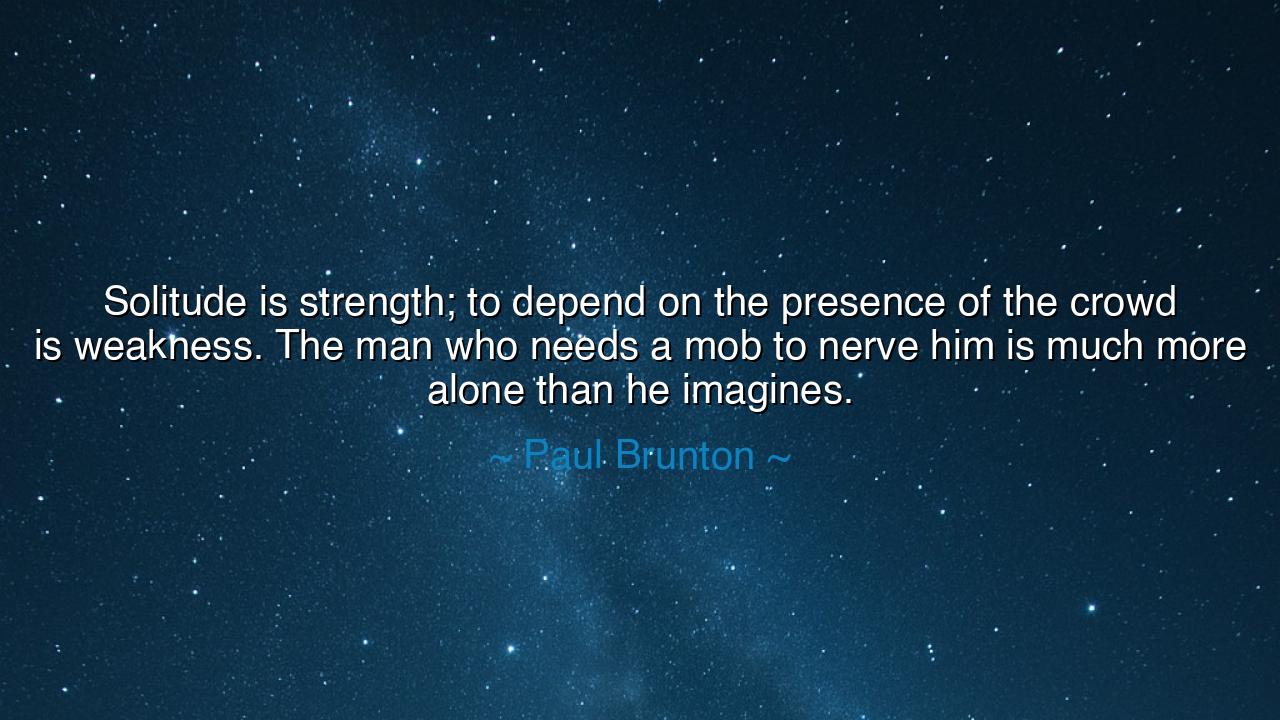
Solitude is strength; to depend on the presence of the crowd is
Solitude is strength; to depend on the presence of the crowd is weakness. The man who needs a mob to nerve him is much more alone than he imagines.






In the quiet depths of solitude, where the noise of the world fades away and the soul can hear its own voice, there lies a strength that few truly understand. Paul Brunton’s words ring with ancient wisdom: “Solitude is strength; to depend on the presence of the crowd is weakness. The man who needs a mob to nerve him is much more alone than he imagines.” These words speak to the profound truth that true strength comes not from the approval or support of others, but from the courage to stand alone, to find one’s own center in the silence, and to cultivate inner strength that does not rely on external validation.
The ancients understood well the power of solitude in the pursuit of wisdom and self-realization. Socrates, for example, did not surround himself with crowds to seek answers but instead engaged in deep conversations and contemplation, seeking truth from within. His wisdom was born not from following the masses but from questioning, reflecting, and standing firm in his own understanding of what was right. Socrates often emphasized that true knowledge comes from self-awareness and solitude, for it is in the quiet of one’s own thoughts that clarity arises, and true wisdom is born.
Similarly, the great warrior Spartans valued solitude as a training ground for strength, both physical and mental. They were not influenced by the whims of the crowd, nor did they seek the comfort of numbers to push them forward. Instead, the Spartan warrior was taught to face challenges alone, to cultivate resilience and courage in the stillness of solitary preparation. A Spartan, standing alone in the face of danger, was a symbol of self-sufficiency and inner strength. Their solitude was not a retreat from the world but a preparation for it—a space where they could focus their mind and spirit on what truly mattered.
Brunton’s reflection, however, calls attention to a different form of weakness—the dependence on others for courage and validation. The man who cannot stand alone, who requires the approval of the crowd to feel empowered, is not truly free. This person, though surrounded by many, is alone in a more profound way than they realize. Their identity and confidence are tethered to external forces, and thus, they are always vulnerable to the changing tides of others’ opinions and judgments. Their solitude, when faced with adversity, becomes a place of emptiness, because they cannot trust their own strength or judgment. This false reliance on others to nerve them creates a deeper, more profound isolation.
Consider the life of Nelson Mandela, whose greatest strength came from the years he spent in solitary confinement. In the face of an entire nation’s oppression and imprisonment, Mandela’s solitude was a test of his character and resilience. He did not rely on the presence of others to strengthen him; instead, he turned inward, finding courage in his own belief in justice and equality. His inner strength was forged in that solitude, and it was that strength that enabled him to lead South Africa out of apartheid. Mandela’s ability to stand alone, to maintain his sense of self and purpose despite the absence of external support, was a testament to the power of solitude.
The lesson Brunton imparts is clear: solitude is not a punishment, nor is it a sign of weakness. Rather, it is in solitude that we find the strength to stand firm in our beliefs, to cultivate our inner resources, and to become truly self-sufficient. The crowd may offer temporary comfort or fleeting support, but true courage comes from the ability to face the world on our own, grounded in self-belief. It is the man who has learned to rely on his own heart, who has faced his doubts and fears in solitude, who can walk through the world with true strength and clarity.
In our own lives, we must seek the space for solitude—not as a means of retreat, but as a place for growth. Whether through meditation, reflection, or simply time spent away from the distractions of society, we must cultivate the strength to stand alone. In these moments of solitude, we can find the clarity to align our lives with our deepest values and to build the resilience that allows us to face the challenges of life with confidence. By learning to stand alone, we unlock a power that no crowd can give us—a power that is self-sustaining, eternal, and unshaken by the winds of external opinion.
Let us take action: In the midst of our busy lives, let us carve out time for solitude and self-reflection, knowing that it is in these moments that we strengthen our inner character. Let us not depend on the crowd for courage, but look within ourselves for the power to rise above challenges. By practicing self-reliance, we can face the world not with the frailty of dependence, but with the strength of a spirit grounded in solitude. Through this, we will not only find our own power but also inspire others to seek the same strength within themselves.






AAdministratorAdministrator
Welcome, honored guests. Please leave a comment, we will respond soon